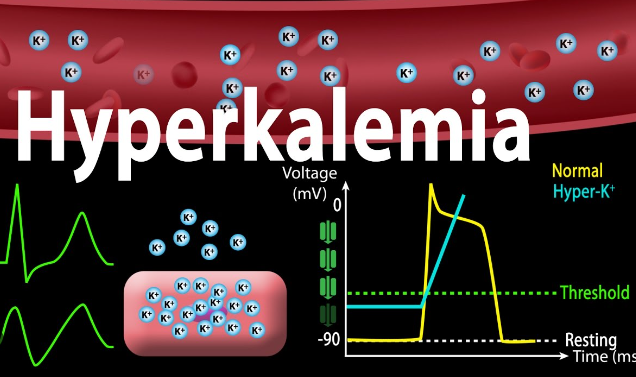People with chronic kidney disease are at risk for hyperkalemia, which in extreme cases could be fatal.
The National Kidney Foundation states that while having a sufficient quantity of potassium in your diet is essential for the proper functioning of your heart, muscles, and nerves, an excess of the electrolyte in your blood can result in hyperkalemia.
3.6 to 5.2 milliequivalents per liter is considered normal serum or blood potassium, according to Dr. Joseph Vassalotti, chief medical officer of the National Kidney Foundation. In addition, he teaches at New York City’s Mount Sinai Medical Center. If your blood potassium level is 6.0 milliequivalents or above, you should get medical help right away since you could have cardiac problems.
Also read-6 Myths Around Childhood Cancer You Need To Know

Causes of Hyperkalemia
It is more common in people who take certain drugs and have decreased kidney function. According to Dr. Daniel Batlle, a medical professor at Northwestern University’s Feinberg School of Medicine, “people with normal kidney function have an excellent potassium tolerance because their kidneys can eliminate potassium efficiently.” In addition, he practices kidney medicine at Chicago’s Northwestern Memorial Hospital. Because there was so much potassium in the food during the prehistoric era, kidney processes evolved to effectively eliminate potassium. But you run the danger of developing it when your kidneys fail.”

Symptoms
It’s possible to have elevated potassium without having any symptoms. “Symptoms may not be present at all until a medical professional measures the potassium level. When that happens, patients need to be treated,” Batlle says. If you know you have kidneys that aren’t functioning well, having your potassium levels monitored should be part of your routine care, Vassalotti says.

These are possible signs of hyperkalemia:
- Muscle weakness.
- Numbness.
- Tingling.
- Nausea.

Risk factors
According to a 2018 study published in the journal Current Medical Research and Opinion, an estimated 3.7 million people in the United States had hyperkalemia in 2014. Researchers discovered that 48% of individuals with hyperkalemia also had heart failure or chronic renal illness. The study discovered that men, older patients, and those with more severe chronic kidney disease had a higher prevalence of hyperkalemia. Researchers from the Boston-based Analysis Group, a worldwide health economics and outcomes research organization, carried out the study.

Diagnosis
Hyperkalemia is diagnosed with a simple blood test that measures potassium levels in the bloodstream, Vassalotti says. “It’s not an exotic test,” he says. “It’s an element of commonly used blood panels.” That means the blood test that’s part of your annual physical exam can include a screening for hyperkalemia.

Complications
Heart rhythm problems are the most serious complications associated with severe hyperkalemia. Severe hyperkalemia can interfere with normal electrical signals in the heart muscle, which can cause life-threatening disturbances of heart rhythm, Vassalotti says. This is “very common” among people with severe hyperkalemia, Batlle says.

Treatment
If you’re suffering from a severe case of hyperkalemia—that is, if a blood test indicates you have a high level of potassium in your bloodstream or if you’re experiencing heart arrhythmia—you should go to the emergency department of a nearby hospital for evaluation and possibly admission and treatment, Batlle says. Hyperkalemia is a condition that can be effectively treated or managed. “Once you have chronic kidney disease, you are at risk for hyperkalemia,” Batlle says. “The first thing you have to do is avoid foods with a high potassium content.”

Also read-Covid Surge: Two New Cases Reported In Delhi; Samples Forwarded For Genome Sequencing
images source: Google
Disclaimer: The opinions and suggestions expressed in this article are solely those of the individual analysts. These are not the opinions of HNN. For more, please consult with your doctor




































